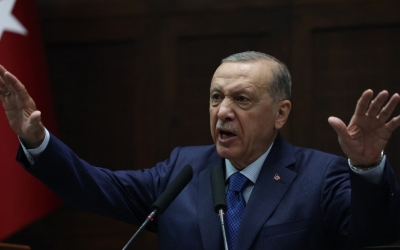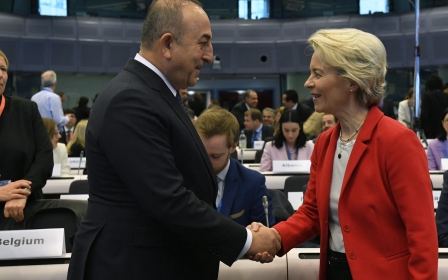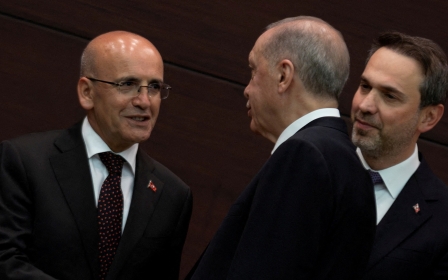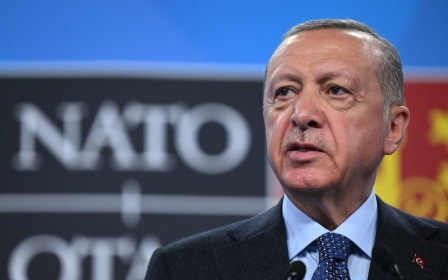Turkey courted to approve Sweden's Nato bid ahead of summit

Sweden failed on Thursday to convince Turkey to lift its veto on the Nordic country's Nato membership bid, but the head of the alliance said it was still possible to reach a breakthrough ahead of a summit next week.
On Thursday, the Turkish and Swedish foreign ministers met at the security alliance's headquarters in Brussels in an attempt to bridge differences.
Turkish Foreign Minister Hakan Fidan said Sweden had taken some steps to address Ankara's concerns over its alleged support for the Kurdistan Workers' Party (PKK), a designated terrorist entity according to Turkey, the US and the European Union.
"Sweden took some steps regarding legal changes, removed defence industry restrictions against Turkey... The legal changes should be put into practice now," Fidan said.
Sweden also said it had taken steps to address Turkey's concerns, with Foreign Minister Tobias Billstrom saying: "We believe from our point of view we have fulfilled all our commitments... It remains a Turkish decision."
On 1 June, Stockholm rolled out an updated anti-terrorism law that Turkey pushed for. It approved the extradition to Turkey of a self-declared supporter of the PKK over drug offences.
On Thursday, the new legislation was put into practice when a Swedish court convicted a citizen of Turkey for "attempted terrorist financing" of the PKK.
'PKK and Putin welcome delay'
Thursday's meeting however was overshadowed by comments Turkish President Recep Tayyip Erdogan made last month stating that Sweden would not be joining Nato at next week's summit in Vilnius, Lithuania.
The Turkish leader pointed to PKK supporters who waved flags and demonstrated against Turkey in Sweden last month.
"While Stoltenberg was expressing these views to us, unfortunately, at that time, terrorists were demonstrating in the streets again in Sweden," Erdogan said. "Now we cannot approach this work positively within this table."
A Quran burning by a man in Sweden during the festival of Eid al-Adha last month has also soured relations. The act was widely condemned within the Muslim-majority world.
Senior western diplomats who spoke with Middle East Eye previously were hopeful that the completion of Turkey's hotly contested May elections and the new Swedish counterterrorism law would be enough for Erdogan to approve the Nordic country's bid.
Nato Secretary-General Jens Stoltenberg has been shuttling between the Swedish and Turkish sides to try to broker an agreement with the hope that Sweden's entry would demonstrate Nato unity as Ukraine presses ahead with a counteroffensive and Russia deals with the fallout of an insurrection by Wagner mercenaries.
"Any further delay in Sweden's membership would be welcomed by the PKK and [Russian] President [Vladimir] Putin," Stoltenberg said on Thursday.
Stoltenberg said he would convene a meeting between Erdogan and Swedish Prime Minister Ulf Kristersson in Vilnius on Monday, on the eve of the summit.
"My main ambition is now to get this agreed by the summit," Stoltenberg said, adding that there had been "good progress" at Thursday's meeting between the countries' diplomats. "It is absolutely possible to have a positive decision at the summit next week."
Meanwhile, Ukrainian President Volodymyr Zelensky will travel to Turkey on Friday for the first time since Russia's invasion for talks with Erdogan.
The meeting is due to focus on an expiring deal to ship Ukrainian grain across the Black Sea as well as next week's Nato summit. Zelensky is expected to push Erdogan to approve Sweden's Nato ascension.
F-16's within reach?
Another factor in Turkey's calculus is whether the US will approve the sale of F-16 fighter jets in return for agreeing to Sweden's ascension. Earlier this year, a bipartisan group of senators told US President Joe Biden that Congress shouldn't consider the sale until Turkey ratifies Sweden's membership.
While the Biden administration has indicated it supports the sale, it faces an uphill battle in Congress. Any one of the four Republican and Democratic lawmakers who sit on the House and Senate foreign affairs committees can block the sale.
Democratic Senator Robert Menendez said in May that Secretary of State Antony Blinken assured him the White House would not override his veto on the deal.
Menendez's disapproval of the sale, along with Democratic Congressman, and ranking member of the House Foreign Relations Committee, Gregory Meeks, is tied to concerns over Turkey's military incursions into northern Syria against Kurdish fighters and its military overflights across islands Greece claims as its own territory.
Michael McCaul, the Republican chair of the House Foreign Affairs Committee, said he is open to the sale, with the expectation of an approval of a sale of more advanced F-35 fighter jets to Greece and Turkey allowing Sweden into Nato.
James Risch, the Republican ranking member of the Senate Foreign Relations Committee, has been less directly outspoken on the F-16 sale but has said that "irritants" in Ankara's relationship with Washington must be resolved before the sale goes forward.
Middle East Eye propose une couverture et une analyse indépendantes et incomparables du Moyen-Orient, de l’Afrique du Nord et d’autres régions du monde. Pour en savoir plus sur la reprise de ce contenu et les frais qui s’appliquent, veuillez remplir ce formulaire [en anglais]. Pour en savoir plus sur MEE, cliquez ici [en anglais].






